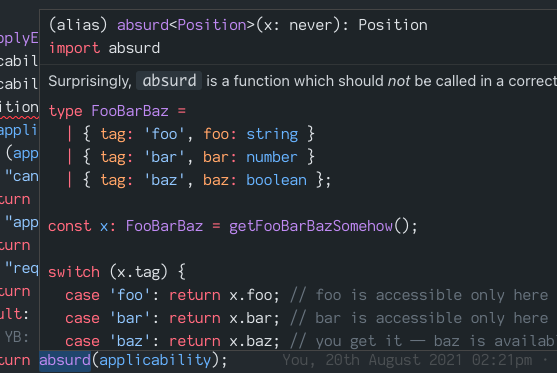Comments as education

Recently I’ve added an absurd function in a project which doesn’t use fp-ts yet. It looked like this:
/**
* Surprisingly, `absurd` is a function which should *not* be called in a correctly typechecked code.
* It is especially useful in combination with algebraic data types (ADTs) for exhaustiveness checks.
* Consider an example:
*
* ```ts
* type FooBarBaz =
* | { tag: 'foo', foo: string }
* | { tag: 'bar', bar: number }
* | { tag: 'baz', baz: boolean };
*
* const x: FooBarBaz = getFooBarBazSomehow();
*
* switch (x.tag) {
* case 'foo': return x.foo; // foo is accessible only here
* case 'bar': return x.bar; // bar is accessible only here
* case 'baz': return x.baz; // you get it — baz is available only here
* default: return absurd(x); // and here `x` is inferred to have type `never`, so we can call `absurd` with it.
* }
* ```
*
* Now let's imagine we need to add another branch into `FooBarBaz` type:
*
* ```ts
* type FooBarBaz =
* | ...previous branches...
* | { tag: 'qux', qux: Date };
* ```
*
* Now our switch won't compile, as in the `default` case variable `x` will be of type `{ tag: 'qux', qux: Date }`
* instead of `never`, and the compiler will warn us about this. But if you suppress this warning and leave code as is,
* `absurd` will blow up in your face at runtime, causing you to go and fix this missing case.
*
* From type-theoretic point of view, as `absurd` requires an argument of type `never` (which doesn't have any runtime
* reprsentation), then it can produce value of arbitrary type. That's why it's type is so strange — `absurd` states
* the following: "if you give me a `never`, I'll give you back anything you want". Satisfying this requirement is
* effectively impossible, that's why such return type is allowed. And due to a simple fact that we cannot
* summon anything out of thin air, two viable implementations of `absurd` would be:
* 1. throw an exception;
* 2. return its argument of type `never` (which is a subtype of everything, thus assignable to anything).
*
* I've chosen here to throw an exception and blow up the application to ensure that calling `absurd` won't be missed.
*
* @param x unreachable value
*/
export const absurd = <A>(x: never): A => {
throw new Error(`Function "absurd" should not be reachable; instead it was called with value: ${JSON.stringify(x)}`);
};
I like to live by the stance that any person who reads my code should be able to learn something useful. Writing a comment like this is a matter of 10-15 minutes, but it helps a lot for educating junior developers — e.g., here they will learn a) about exhaustiveness checks by example, and b) about never type and its application in production code. Moreover, such mini-article with nice code highlight will be available at a hover away:

P.S. I wish TypeScript supported literate programming natively.